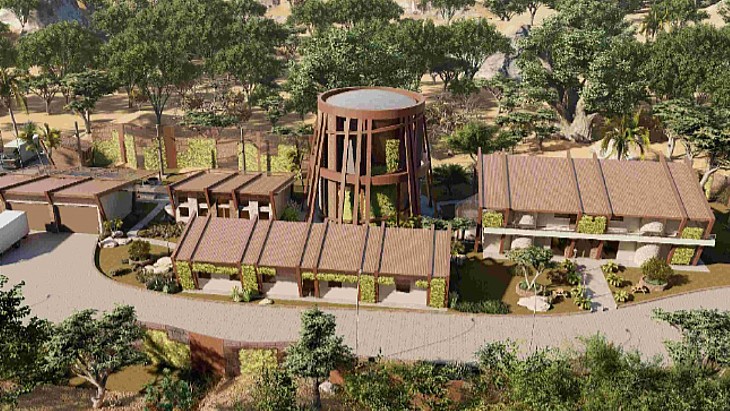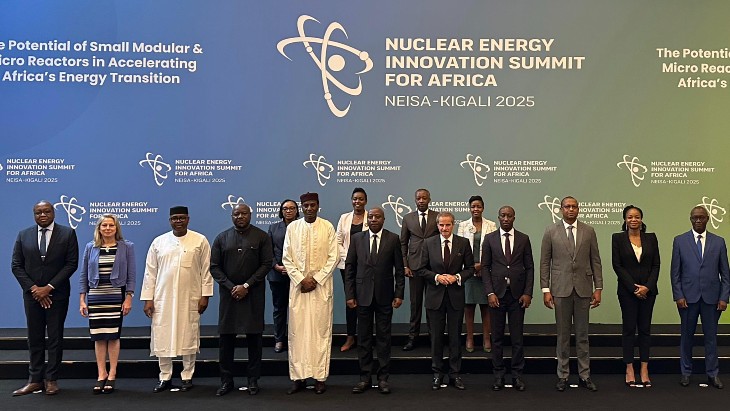The commission said that discussions at the event in Rwanda emphasised "the urgent need to synchronise the rapid advancements in SMR/MMR generation with the long-term, complex development of regional and national transmission and distribution infrastructure".
Robert Lisinge, Director of Technology, Innovation, Connectivity and Infrastructure at the UN Economic Commission for Africa, stressed the opportunity "to conceptualise and potentially develop regional nuclear projects that involve perhaps multiple countries, which would accelerate energy integration as well".
Claver Gatete, Executive Secretary of the UN Economic Commission for Africa, writing for the Africa Renewal digital magazine, said that across the continent 600 million people lack access to electricity, with “power poverty” stifling "industrialisation" and also limiting healthcare outcomes, and constraining "economic transformation even as Africa exports uranium and other critical minerals to power many parts of the world".
He noted “encouraging developments” such as the construction of Egypt’s El Dabaa nuclear power plant and Ghana partnering with NuScale Power to explore options for small modular reactors (SMRs) that could power mines and cities. “Furthermore, countries that fall under the Tier 1 category - Egypt, Rwanda, Ghana, Uganda, South Africa, Nigeria and Zambia - are firmly committed to starting or expanding their nuclear energy programmes. Governments in Niger, Kenya, Tunisia, Morocco, Ethiopia, Tanzania, Namibia, D.R. Congo, Senegal, Algeria and Zimbabwe are working towards the role of nuclear energy in their future electricity supply systems."
Gatete says that with large-scale increases in electricity demand in the coming decades in Africa “the path ahead is clear - we must harness nuclear energy’s potential and adopt a bold political commitment backed by a clear national roadmap, including target dates for operational plants and long-term capacity-building initiatives".
The summit, hosted by Rwanda and the Rwanda Atomic Energy Board, was organised in collaboration with a range of other key international institutions, including the International Atomic Energy Agency (IAEA), Nuclear Energy Agency and World Nuclear Association as well as leading regional financial institutions.
IAEA’s first SMR school launched in Africa
In May the International Atomic Energy Agency held the first of its new regional 'SMR School' workshops in Kenya, aiming to help inform governments, regulators and industry of the potential role of small and micro modular reactors in the energy mix.
Aspects covered in the inaugural event - more are planned for Asia and Latin America - included issues such as technology development and demonstration, legal frameworks, stakeholder engagement, and safety, security and safeguards.
Dohee Hahn, IAEA SMR Platform Coordinator, said: "As countries seek clean and reliable solutions to their energy and development challenges, they are increasingly looking to nuclear energy as an option, particularly SMRs. The new IAEA SMR School aims to fill a critical gap for countries in better understanding the array of issues involved in the development and deployment of this promising new technology."
Stratek Global says site offered for its SMR
Meanwhile, South African high-temperature gas-cooled reactor developer Stratek Global said that it has agreed on a potential SMR site in the Zilkaats Estate near the border of Gauteng and Northwest Province.
Stratek chairman Kelvin Kemm says its HTMR-100 reactor’s use of a Helium gas-cooled system means water is not required for cooling, and it occupies an area smaller than a football field, with both aspects leading to flexibility in potential siting.

How an HTMR-100 unit could look (Image: Stratek Global)
Zilkaats Chairman Gabriel Mokgoko said: “Not only do we need this electricity to develop the Zilkaats site to its full potential, but we also recognise the financial potential of getting into this exciting development.” The site could also in future host manufacturing facilities for SMRs and nuclear fuel, the companies’ said.
Stratek Global said it would be engaging with local stakeholders and ensuring the project meets South African National Nuclear Regulator and IAEA safety standards, with construction able to begin once regulatory approvals and finalisation of financing.







_15863.jpg)







